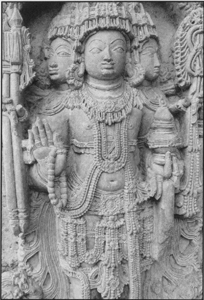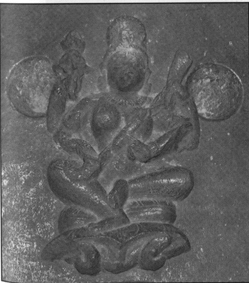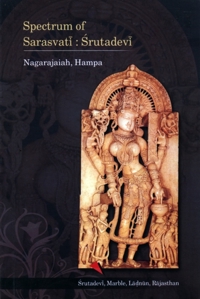 |
[37] Brahma, Haḷebiḍ |
Equally notable is the mention of twelve years famine in the Mahābhārata [2nd-1st cent. Bee]. During the drought of twelve years, Sārasvata was fed by his mother Sarasvatī. In the course of these twelve long years, the seers had lost knowledge of the Vedas. However, Sārasvata taught the Vedas to other sages anew [Mahābhārata: 9: 50. 37J. Sārasvata, son of Sarasvatī, teaching Vedas to sages, is significant. 'He', instead of his mother 'she', teaching to male seers, was deviced to uphold the custom of male teaching to male, in a male-dominated society [Ludvik III]. Parallel record of similar twelve years famine comes from Jaina textual sources. In the wake of the twelve years drought, Śrutakevali Bhadrabāhu and his pupil Candragupta, the Mauryan emperor, and their cortege left Ujjaini and finally reached and settled at Śravaṇabeḷagoḷa.
 |
[38] Sarasvatī, Khajurāho |
Śrutadevī, couched in Jaina ideology, in śāstra-granthas, books of knowledge, provide a wealth of information. In the non-Jaina corpus of literature, Sarasvatī figures first in the Ṛg Veda [C. 1500 bee] as Saptāsvasar and vāc. It is said that the Vedas emerged from her - Sarasvatyāḥ Sarve Vedāḥ abhavan. Later she figures in the Mahābhārata, [2nd - 1st cent, bee], Mārkaṇḍeya, Vāyu, Viṣṇudharmottara and Skanda Purāṇas, initially as a sacred river along which pilgrimages were made, and then as a deity of vāk, speech. The Mahābhārata refers to Sarasvatī as a ocean-bound great stream: nadīnām uttama nadī, prasanna-salilām, paripūrṇām sarasvatīm, sarasvatī puṇyavahā hradanī vanamālinī, divyāḥ puṇyāḥ samudragāḥ, sadā puṇyatamā śubhe, etc.,
However, Mahābhārata continues to record that this river disappears in the sands because of the unrighteous Niṣādas, 'the hunters' and changes her course for the righteous Brahman seers towards eastward. Thus the discrimination ascribed to Sarasvatī is from the Vedic Brahman's point of view. Sarasvatī was dear to Ṛṣis, Yakṣas, Vidyādharas, demons and deities engaged in ascetic practices on her banks. Albeit, 'when Kṛṣna passed away, his sixteen thousand wives drowned themselves in the Sarasvatī, and having been reborn as Apsaras, they attained their lord' [Ludvik 100; Mahābhārata 18:5:21].
 Prof. Dr. Nagarajaiah Hampana
Prof. Dr. Nagarajaiah Hampana
